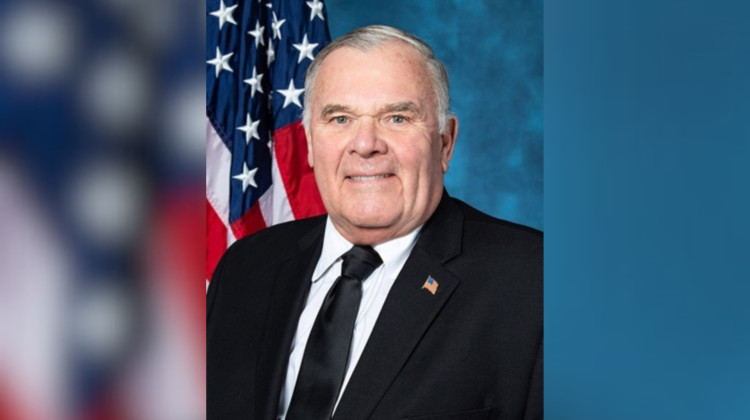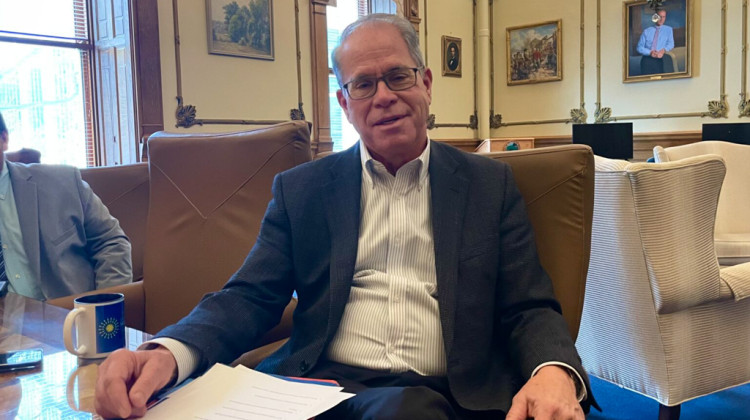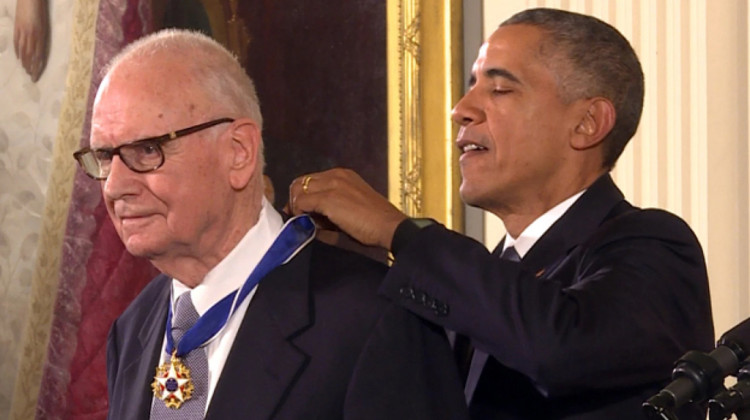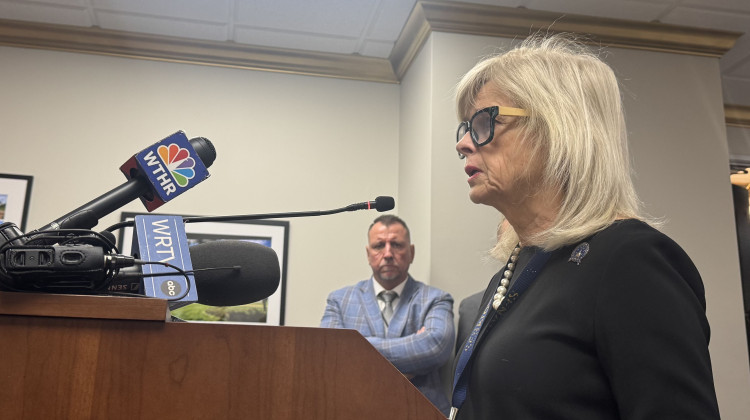
Jim Baird has served in the U.S. House of Representatives since 2019. He has a Ph.D. in animal science. He was previously a farmer, ran a home health care business and is a veteran of the Vietnam War.
Courtesy of IN.govWFYI is speaking with U.S. House of Representatives candidates running for election in Central Indiana.
Jim Baird is the Republican incumbent running for reelection in Indiana’s 4th Congressional District, which represents a large western area of the state including Martinsville, Crawfordsville and Lafayette. He faces Democrat Derrick Holder and Libertarian Ashley Groff.
Baird has served in the U.S. House of Representatives since 2019. He has a Ph.D. in animal science. He was previously a farmer, ran a home health care business and is a veteran of the Vietnam War.
WFYI's Zak Cassel sat down with Baird to discuss why he wants to stay in office.
This transcript has been lightly edited for clarity and style. WFYI fact checks all candidate interviews and provides editor’s notes in the audio and digital publications.
Zak Cassel: Our country is facing multiple crises in politics, the economy, social issues such as abortion, and more. If you’re re-elected, what will be your legislative priorities?
Jim Baird: I think that's the inflation that is really adding to the cost of everything. And, you know, this war on fossil fuels really started that back with this administration, when they closed down the Keystone pipeline.*
And everything moves by air or land or sea, which takes engines, and it takes fuel, and that adds to your cost. And as soon as you interrupt that process — I'm not saying that we shouldn't move to some alternative fuels, but I think it should be a reasonable process, and let economics dictate how those move forward, rather than all of a sudden move to electric vehicles or something like that.
*Editor's notes: President Joe Biden suspended the controversial Keystone XL pipeline on his first day in office, by executive order, citing climate change as a factor that informed his decision. For more context, the Keystone XL pipeline has been controversial for decades, you can find a brief history of earlier controversy in this 2014 reporting from NPR.
Cassel: What are your policy proposals for inflation and dealing with the economy?
Baird: Well, the first question there really kind of answers that. My first reaction, and I think that would be some of my colleagues’ feelings as well, but I would encourage us to get back into the energy market and make sure that we open up those gas fields and allow drilling wherever we need to have it — within a safe manner — but to make sure that we have an ample supply. We've got ample supply of energy here, and so I think we need to capitalize on that, rather than penalize our people.
Cassel: I want to talk about something specific now. So your congressional district is pretty rural. You sit on the House Agriculture Committee. The so-called farm bill is a major piece of legislation but Democrats and Republicans have strongly disagreed on the bill’s renewal. The farm bill includes financial assistance to farmers and funding for research. But the Republican-backed proposal makes significant cuts to SNAP, or the food stamp program, by some estimates $30 billion. It also removes climate-forward requirements farmers must meet to access certain financial assistance. These proposals are opposed by Democrats who have put forward a competing bill in the Senate. How would you work with your party and Democrats to pass a version of this bill in time to meet the September 30th deadline?
Baird: Well, I think you have to work together hopefully. You know, we passed a bill out of the House and out of the ag committee that received a lot of support from ag business, from a lot of the associations affiliated with agriculture, and was very positive about that.*
The second thing I want to make sure, you mentioned the SNAP program and so on. When we started discussing and made a draft of the bill, it was 85 percent of it was going to SNAP, or the food assistance programs, and it's back, it’s declined some from that. But I really want to make sure that people understand. It's called the “farm bill,” and so I think it's easy to think that farmers and ranchers are getting rich from the farm bill. And let me tell you, when you've got $1,100, or even better, in cost, in every acre of corn you put out, for example, then you really have got a lot of risk if you've got several thousand acres.
So it becomes important to provide a safety net, which means crop insurance or commodity programs that help farmers get through those difficult times. And so it's a misnomer to call it the farm bill, as far as I'm concerned, because it really does involve the SNAP and other food assistance programs, including those like USAID for countries across the ocean. So, the fact that we need to have the discussion that you just mentioned, because the Senate bill is somewhat different? But you know that's set up so that we can have a conference committee at the end and resolve those issues.
But I think it's important that we get this farm — how can you make — and you know the bill was supposed to be done by the end of last year, and here we are another year late, trying to get it passed. But how do you make plans in the farm community and ranch community if you don't know what kind of programs are available to you to provide a safety net?
*Editor's note: The bill did not pass out of the House. It is possible the candidate misspoke here, because he says later in his answer that it is important to pass it. We are currently operating on the 2018 farm bill, which was extended in 2023, and action was delayed on the September 30, 2024 deadline. Read more here from Farm Aid on hopes Congress will pass another extension in the lame duck session (after the election and before the next administration starts).
Cassel: Are you open to more funding for SNAP than the current proposed bill in the House?
Baird: I'm always willing to discuss needs for people in need, and I don't mind providing need — those that need a hand up. But I'm not supportive of a hand-out kind of approach. So… and I do think that for those individuals that are single and do not have dependents, I think there could be — or should be — a work requirement associated with those programs.
Cassel: I want to switch gears a little bit. You have a scientific background. Your alma mater Purdue University puts out an annual report on climate impacts in Indiana and indicates that some of the greatest risks in the state will come from hotter temperatures, increased rain, and flooding. Nationally, the past 10 consecutive years have been the hottest on record since 1850. Heat waves have resulted in deaths across the country. You've talked about the importance of data analysis to properly arrive at conclusions about climate science in the past. What does the evidence tell you about climate change?
Baird: Well, I think there’s a lot of research that needs to be continued to be done, because we can change the genetics of crops and plants to make them more tolerant to a heat situation. I think we can adapt as an animal species, so to speak, we can adapt to the climate. That doesn’t mean we don’t need to use those things like ethanol in our fuels to cut down in our CO2 imprint. And we can also use, you know, methane as a fuel, and we can capture that from the livestock waste, and so and so.
I think there’s an awful lot of opportunity to incorporate research into our decision making, in terms of climate change.
Cassel: So, you covered some of this in your answer, but some members of your party don’t think climate change is real. Others think it’s happening but not urgent. And some support certain climate solutions. Specifically, what are your policy proposals for addressing the impacts of climate change?
Baird: Well, to make sure we’re using the appropriate research to make the decisions about how we go about making changes that are relative to climate change. And… I think it’s important that we recognize that there are a lot options in terms of adapting to that kind of environment. And it doesn’t mean that we need to provide everyone an air conditioner or get rid of gas stoves, or gas furnaces, and that kind of issues. I think we need to be more pragmatic and practical with that kind of information, in terms of the — instead of jumping to a Green New Deal.
Cassel: I want to talk about something different, but related in a specific way. The Republican party’s 2024 platform on immigration proposes the largest deportation in the country’s history, and strengthening ICE and border protections, among other things. In the agriculture industry, there are an estimated 2.9 million farmworkers in the U.S., according to the National Center for Farmworker Health. About 70 percent are foreign-born. These farmworkers are a vital part of the country’s agricultural production. They are also among “the most socially and economically disadvantaged people in the U.S.,” according to the National Center for Farmworker Health. How would your policies address the impacts of this immigration agenda on the agriculture industry?
Baird: Well, I think you’re confusing two issues there, trying to lump ‘em all together. I’m well aware of the need for farmworkers, agricultural workers — in fact, I worked with a representative from California where we talked about the H2A program, and the recognition that… milk cows need to be milked every day, the pigs need to be fed every day, and those programs were really for a short period of time. And so, there is a need for this annual labor force.
But on the other hand, I don’t think it’s fair to bring people in as illegal immigrants, and you’re indicating, as far as I’m concerned, that all of those are going to be farmworkers, and that’s not the case. And so a lot of those individuals coming across the border illegally are creating a lot of problems for our country. And I don’t have to name all of the ones that have killed or murdered or raped or whatever as they’ve been in this country, so we’re gonna have to take care of that.*
So now, we need to make sure we separate those two issues, and those individuals that came here legally and earned their citizenship do not appreciate people being able to come — walk around across our border and not have to make any effort to become an American citizen. So I think it’s very… dangerous to equate those two to make sure that — I mean to indicate that — we’re all gonna have farmworkers out of that.
*Editor's note: There are fact checks that debunk the claim that many immigrants are illegally entering the country and committing felonies that harm citizens. The Associated Press reports, “Texas is the only state that tracks crime by immigration status. A study published by the National Academy of Sciences, based on Texas Department of Public Safety data from 2012 to 2016, found people in the U.S. illegally had ‘substantially lower crime rates than native-born citizens and legal immigrants across a range of felony offenses.’” The unproven claim that many people in the U.S. illegally are criminals is also the basis for a mass deportation plan. You can read more fact checks from NPR here.
Cassel: So there are farmworkers that are in this country without citizenship. I am not suggesting that all of the immigrants that are coming into the country illegally are becoming farmworkers. But, considering there is a significant percentage of those estimated to be foreign-born, would you support any form of legal protections or paths to citizenship for farmworkers?
Baird: I think the whole immigration system needs good reform. And I don’t mind providing approved ways to vet these individuals, or to have them have a chance to become a citizen. But I sure don’t want it to happen just by opening up our borders and let 8 million or 9 million people come into this country.
And as well as, there’s 200,000 — some number like that — 200,000 children that we have no idea where they’re at? And I would guess that many of them are susceptible to sex trafficking, or trafficking, or labor — indentured servant kind of situations, and so I think we need to close our borders and to make sure we know who’s coming into this country and to make sure we vet them appropriately.
Cassel: I want to ask about something in 2020. So, during the 2020 election's certification process, you voted against certifying vote counts from both Pennsylvania and Arizona and lent your name to a lawsuit challenging the results of the election. Perhaps the most prominent way critics now frame these challenges, and former President Trump's rhetoric around that election's results, is that it's a threat to democracy. What do you make of these criticisms?
Baird: Well, at the time we made that decision, there were some things happening at those election centers that… that seemed inappropriate. And I certainly thought that it deserved to have that put a halt on those… process until we could resolve that.
Cassel: What were some of the specific things of concern to you?
Baird: Well, when I saw… vote counts being carried in in boxes, after hours, we saw that sort of thing. We had a lot of mail-in ballots that were in boxes that… were out on the street, like post office boxes.* So all of those things I think brought a concern for a lot of people.
*Editor's note: The Associated Press debunked the data it could find that people saw vote counts carried in boxes – which was made in a film by conservative filmmaker Dinesh D’Souza called “2000 Mules.” The AP found that the states the film focused on don’t allow other people to deliver someone else’s ballots. Reuters also fact-checked the same documentary and had similar findings. An exhaustive AP review of “every potential case of voter fraud in the six battleground states disputed by former President Donald Trump has found fewer than 475 — a number that would have made no difference in the 2020 presidential election.” You can read more on voter fraud here, from NPR.
Cassel: There are Republicans openly preparing to challenge the results in November. Some see these pre-emptive challenges as a bad-faith campaign strategy. What kinds of preparations do you think are needed heading into this election?
Baird: Well, I think Indiana would be a good example. You know, the people we’ve had in the Secretary of State’s office has done a great job of making sure that we have secure elections and that we have control of our ballots, and appropriate analysis of where those folks came from, and who’s doing it — instead of ballot harvesting.
Cassel: How will you evaluate whether the results of this election are legitimate?
Baird: Well, I think it opened our eyes in 2020, so we’re going to be more observant, probably have more interest in how that’s happening, and I think the states are going to be involved in making sure that they have fair elections, cause if people lose confidence in our election process, then in essence, in my opinion, you’ve lost confidence in our country, so… I think that’s a concern.
Cassel: After widespread concerns about President Joe Biden’s age impacting his ability to govern the country in a second term, he stepped down from his campaign. Former President Donald Trump is only three years younger than President Biden. How should voters weigh a candidate’s age when deciding who to vote for?
Baird: I think that depends on the individual. And I think that depends on how capable and how cognitive they are to be able to handle the process and — the presidency is not an easy task by any means, and to be able to respond to a threat or a challenge at 2 or 3 o’clock in the morning, we need an individual that has that ability.
Cassel: Can you tell us who you're backing for Indiana Governor and U.S. President in the upcoming election?
Baird: I think that — that remains to be seen.*
Cassel: Thank you so much, Congressman.
Baird: Thank you.
*Editor's note: WFYI reached out to Rep. Baird’s campaign for clarification on his endorsements for governor and president. Mark Warner, a campaign consultant for the Congressman, wrote, “He is supportive of the entire Republican party ticket and the Congressman even endorsed Trump before the Iowa Caucus. Your proceeding question was about the 2020 election and the Congressman interpreted your question to be in alignment with the people's faith in the security of our 2024 elections.”
 DONATE
DONATE






 Support WFYI. We can't do it without you.
Support WFYI. We can't do it without you.